

FRESHMAN INFLUENCERS TAKE OVER TIKTOK


Photo Courtesy of Colette Couillard “I went to the Olivia Rodrigo concert and there were little girls coming up to me, and one girl was crying and I didn’t know that I had that effect on younger kids.”
Colette Couillard makes an impact
By Keira Faddis Co-Opinion Editor
Colette Couillard, lifestyle influencer and UM freshman, was only a high school sophomore when she first went viral. She made a video on a new TikTok account talking about her then boyfriend breaking up with her.
“I posted it on TikTok, and it went super viral,” Couillard said. “At first I thought it was just funny, but then I realized people were actually following me and interested in my life.”
That single post launched her career. She racked up 500k followers in the months after her initial post. Even after the account was banned, her new account has since caught up to the original follower count, with more than 660k followers.
The UM marketing major describes her niche as lifestyle. Couillard’s feed offers a glimpse into college life, Miami culture and the realities of growing up online with get ready with me videos and vlogs of her nights out with friends.
“I’m on my phone all the time, doomscrolling,” Couillard said. “Whenever I see an interesting concept, I take inspiration from it or just think of the things people might find interesting about my life here.”
A typical day for Couillard involves juggling her classes with not only her social life, but her job as an influencer. She posts two or three videos daily, and has already found her routine on campus.
She usually films a “Get Ready With Me” video in the morning, goes to classes in the afternoon and then scrolls for more inspiration at night. After years of balancing schoolwork and sponsorships, she’s learned how to manage both worlds without letting either side take over.
“I’ve been doing it since my sophomore year of high school, so it’s just a habit now,” Couillard said. “If I have a big brand deal due the same week as exams, I just tell them to wait one second — school comes first.”
CONTINUED ON PAGE 5

Photo Courtesy of Nikki Pindor
“Even if you’re the kindest person out there, you’re still gonna have to deal with rumors and hate. You just have to be mentally strong. It comes with the platform.”

Nikki Pindor has your attention
By Talia Gorelick Contributing Writer
Everyone who scrolls on TikTok knows Nikki Pindor. At least, everyone thinks they do. She’s a freshman who accidentally killed her dorm fish, cooked for frat boys just to watch the comments explode and posts viral, cringey “Get Ready With Me” videos.
She calls it trolling and her comment section calls it a train wreck. Either way, her strategy to get famous is working, and it might just be genius.
In just a month, Pindor went from “irrelevant” to unavoidable, the kind of campus celebrity who can’t leave her dorm room without ending up on YikYak, a social media app where users can make anonymous posts. And the kicker? She’s already making five figures a month while doing it.
“Song promos go for like $400,” Pindor said, shrugging. “Just for putting it in the background of a video.” Add brand deals, collabs and a manager she casually met at a house party, and suddenly she’s on her way to graduating debt-free.
How did Pindor troll her way to making $20k a month without losing her GPA or her mind?
Pindor didn’t wait long to test the waters. In her first week on campus, she was like any other freshman. By the second week, she was all over TikTok.
“I started posting general UMiami content,” Pindor explained. A TikTok about “Pancakes with Pat” got her on people’s Tik Tok For You pages immediately. Then came the infamous fish video. By the third week of classes, people were stopping her in the Mahoney-Pearson dorms for photos.
“I post controversial stuff once in a while,” Pindor said. “If I want to get an extra boost, I’ll post some ragebait. And those always work.”
CONTINUED ON PAGE 5
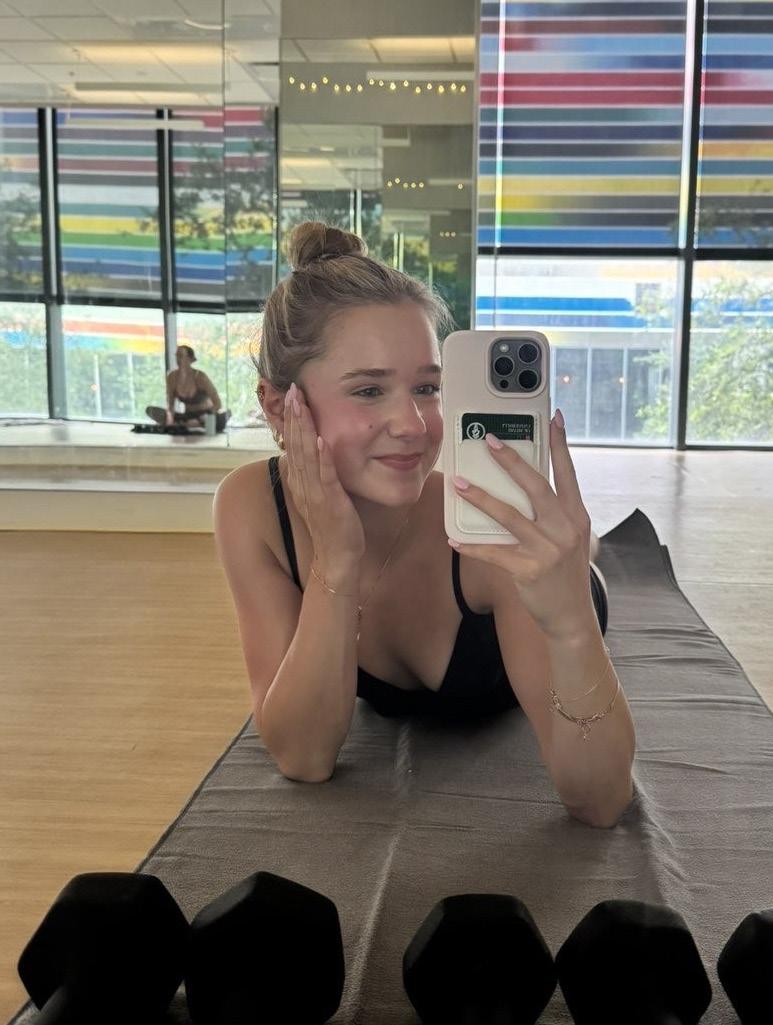
Photo Courtesy of Julia Thomas
“I
‘Porch
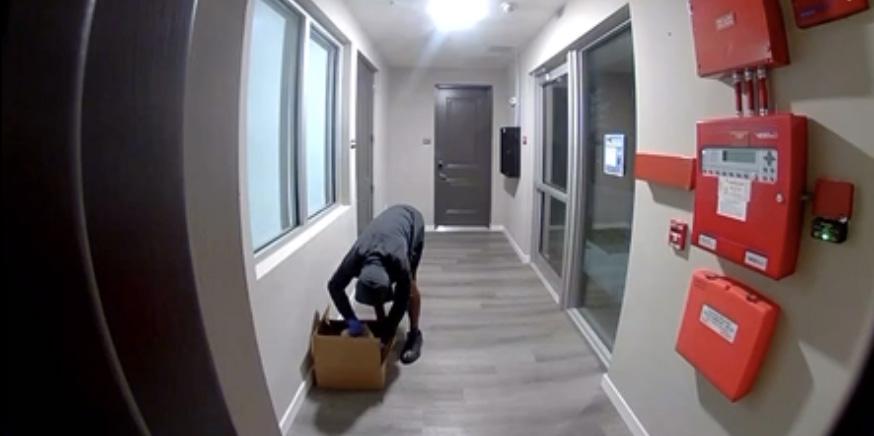
By Hannah Valdivia Contributing Writer
Several reports were made by residents of The Cloisters Miami, off-campus apartment complex located on SW 57th Ave behind the Wellness Center, that a “porch pirate” had been seen on camera stealing packages from their front doors.
Tiyana Hartwell, a junior at the University of Miami, shared Ring camera footage with The Hurricane, showing a concealed young man fumbling through a package at their

just want to have friends and a community that makes me feel safe. If you don’t like me, that’s okay — I’ll find my people.”
Julia Thomas keeps it real juliaathomasss
By Vivian Amoia Contributing Writer
Julia Thomas is a well-known face on campus thanks to her almost 65,000 TikTok followers.
Before becoming a popular creator and coming to Miami, the UM freshman attended high school in Dallas, Texas and cheered competitively for eight years.
She started making content her senior year and blew up at the beginning of the summer when she posted a video with her boyfriend Hunter, who plays baseball at Texas A&M. The video received a lot of attention and many people shared their opinions about their soon-to-be long-distance relationship.
“People really liked that video because it was about my boyfriend. They had a lot to say and some people didn’t think we’d make it,” Thomas said.
The backlash didn’t bother her. She knows her boyfriend, who has been with her for more than four years, and her relationship better than strangers on the internet.
Thomas uses her platform to build an authentic community, posting a mix of content like “Day In The Life” videos, sit-down chats, fashion content and wellness. Her favorite videos are ones where she sits and talks directly to her followers about her life or advice she has for them.
“I feel like people like to put a huge facade up on the internet. It’s nice for people to hear that others struggle too,” Thomas said.
When choosing where to go to college, Thomas chose UM because of the big city but smaller campus community.
Her favorite spot on campus is the Lakeside Patio by the stage where she likes to eat dinner, study and watch the sunset with her roommate. Outside of campus, she loves to explore spots in Coconut Grove, Brickell and South Beach.
CONTINUED
pirates’ documented stealing packages at The Cloisters Miami
front door and walking away on Sept. 8 at 4:20 a.m.
Other residents expressed concern for their safety as several similar incidents have occurred within the same complex.
“There have been multiple incidents of a man sneaking into apartments around three in the morning and taking packages,” said a resident who wished to remain unnamed.
“Several residents have asked management to address the issue, but their response has been lackadaisical.”
When asked to comment on the situation, The Cloisters Miami re-
sponded that they were “looking into the situation but as of now have no record of any form of theft.”
However, the Cloisters’ response has left some students concerned for their safety, complaining that “their inaction is worrisome” and “students don’t feel their safety concerns are being taken seriously,” as shared by the same unnamed resident of the apartment complex. This is not the first time the apartment has been under fire for reports of “unsafe conditions.”
Photo Courtesy of Tiyana Hartwell
A concealed young man rummages through a package at UM junior Tiyana Hartwell’s front door at The Cloisters Miami on Sept. 8 at 4:20 a.m.
H-1B Visa fee threatens UM employees and student opportunities
By Casey Servatius Senior Staff Writer
Universities nationwide may be unable to continue hiring qualified researchers, professors and medical practitioners following the Trump Administration’s new fee for H-1B visa applications.
President Trump issued a presidential proclamation on Sept. 19, placing a $100,000 fee on any new petitions for H-1B visas following Sept. 21, 2025.
United States employers typically obtain H-1B visas for highly-skilled international employees working in engineering, technology, finance and medical fields.
According to the Miami Herald, 2,589 university workers have required an H-1B visa in Florida in the past five years. The University of Miami accounts for 13% of that total, or approximately 336 people.
In the first three quarters of the 2025 fiscal year, UM filed for 137 H-1B visas.
H-1B visas historically cost be-
The Institute for Individual and Family Counseling returns to UM
By Skyla Thomas Contributing Writer
The Institute for Individual and Family Counseling reopened on Aug. 18 following its closure during COVID-19. The IIFC is a training clinic for graduate students in UM’s Department of Educational and Psychological Studies within the School of Education and Human Development.
Counseling sessions are available in English and Spanish, both in person and virtually. The students provide individual, group and couples counseling under the direct supervision of University of Miami faculty. This program provides hands-on learning experience for students, while simultaneously providing affordable mental health services to their local community.
Many of the graduate students working at the IIFC are second-year master’s students pursuing their license in mental health counseling. They must complete at least 700 hours in a year, 280 of these being direct hours working unpaid with clients.
George Welch is one of these interns
“I like how [the IIFC] includes [counseling for] everyone, like people of different heritages and ethnicities.”
Gabriela Sanchez IIFC Intern
working toward becoming a registered mental health counselor intern.
Welch says that all of the sessions are recorded for educational purposes, then deleted later. They are recorded for liability reasons, and for interns to learn from under the supervision of a psychologist or licensed clinician.
“We go over [the recordings] with our supervisor just to figure out if the right interventions are going to be utilized or [what are the] therapeutic goals,” Welch said. “And then after that, we delete the recordings because of confidentiality purposes.”
Gabriela Sanchez, an intern at the IIFC, says she found this opportunity through her classes at UM. She explained that the program’s inclusivity was one of her main reasons for joining.
“I like how [the IIFC] includes [counseling for] everyone, like people of different heritages and ethnicities,” said Sanchez. “It isn’t just for the elderly, it’s not just for young people. It’s anyone that needs therapy.”
The IIFC works hard to include anyone in the Miami area who is in need of counseling despite socioeconomic status. Morgan Reilly, who started working with the IIFC in August, emphasized the accessibility of the counseling service. “It’s a community-based center, so

tween $2,000 and $5,000, meaning universities could be spending $10 to $20 million to maintain current hiring levels. However, it is more likely that sharp cutbacks will take place on hiring talented foreign workers for research, clinical care and STEM courses. In an interview with the Miami
Herald, Bruce Baker, the chair of the department of teaching and learning at UM said, “Universities will most certainly take a hit from this policy change.”
The majority of H-1B visa workers at UM are among biochemists and biophysicists, followed by health specialities teachers, medical scientists
and molecular and cellular biologists.
Students are concerned that they could be facing a decrease in access to talented professors in the future because of the high concentration of foreign workers employed in these fields.
“The STEM departments at UM could definitely struggle from a loss of international professors,” said Siri Ravi, a sophomore studying microbiology and immunology. “It was interesting to experience [international professors’] teaching styles because they’re different from professors I’ve had before.”
Science students also reported that it is already challenging to acquire research opportunities with the current, full staff of professors.
“A lot of professors are really stingy about using their name to get research opportunities. They are very careful about saying yes to requests for recommendations,” said a chemistry student who wished to remain unnamed.
If UM has to cut back on the number of international professors it hires due to H-1B visa fees, students may have a harder time contribut-
ing to research. A smaller staff in the STEM departments would have adverse effects on the student body, seeing as the School of Nursing and Health Studies is home to approximately 1,500 students. Additionally, the College of Arts and Sciences is the largest college at UM with around 35% of undergraduate students, many of whom study biology, chemistry or computer science.
International professors wanting to work in the U.S are not the only group that could be negatively affected by a high H-1B visa fee. International students looking to stay in the country after graduating from UM may also face challenges.
“Everyone on a student visa will have to apply for a different visa because it expires when you graduate,” said an international student who wishes to remain unnamed.
For instance, graduating international students with job offers in engineering, architecture or medical professions have the option of applying for an H-1B visa. If they can not afford the $100,000 fee, they would have to look into other options.
Survey results reveal that most know and ignore vaping policy
By Vivian Amoia Contributing Writer
The University of Miami Coral Gables campus became a smoke free campus on August 1, 2013, making smoking prohibited on all campus property. Even with this policy in place, a cloudy haze can still be spotted all around campus as students use their e-cigarette devices.
According to the university handbook, “Those who violate this University policy will be referred to the Dean of Students Office and are subject to disciplinary action.”
The policy includes “inhaling, exhaling, burning, or carrying any lighted cigarette or electronic cigarette, cigar, pipe or other such device which contains tobacco or other smoke producing products.”
Despite these consequences, vaping remains a prevalent issue on campus.
According to a Google Form survey posted on the @themiamihurricane Instagram on Oct. 13 and filled out by 162 UM students or faculty, the places you are most likely to see a student smoking is in dorm rooms or halls, the dining hall and in buildings like Whitten, Shalala and Dooly. When prompted with the question, “Have you ever seen a student vaping on campus? If so, where?” An anonymous student responded to the form, “Yes, everywhere.”
87% of survey takers are aware of the campus rules, but nearly 70% of responders feel that the exact policy and consequences could be communicated more clearly.
The policy document states, “Smoke-Free Ambassadors, faculty, staff and students are encouraged to directly and politely inform those unaware of the policy or remind those in disregard of it.”
The document later states that students will face disciplinary action.
Even if the rules were communicated better, that doesn’t necessarily mean it would stop students from vaping all together. In fact, the results of the survey above show that nearly 44% of responders think that the root cause of this cloudy haze is addiction.
According to an article by Statistica, as of fall of 2024, 24.8% of college students used tobacco or nicotine products daily or almost daily within the past three months.
“They’re either addicted to it or they just don’t feel like following the rules because they know they probably won’t get caught,” said a student who wishes to remain unnamed.
On the student health center website, a variety of resources are offered to
we also offer services at a lower cost for people so that we make it accessible,” said Reilly. “Our starting [price] is $50, but we do have a sliding scale because we do want to work with families, individuals, and couples.”
A client may meet with the same counselor continuously from intake until termination. Sanchez says it is important to create a judgment-free place where individuals can receive the care they need. For example, many of her clients appreciate the chance to talk to someone who isn’t a close friend or family member and can listen without judgment.
Julian Maceira, another student working toward his hours at the IIFC, says part of what excited him about joining was the clinic’s strong community reputation before COVID-19.
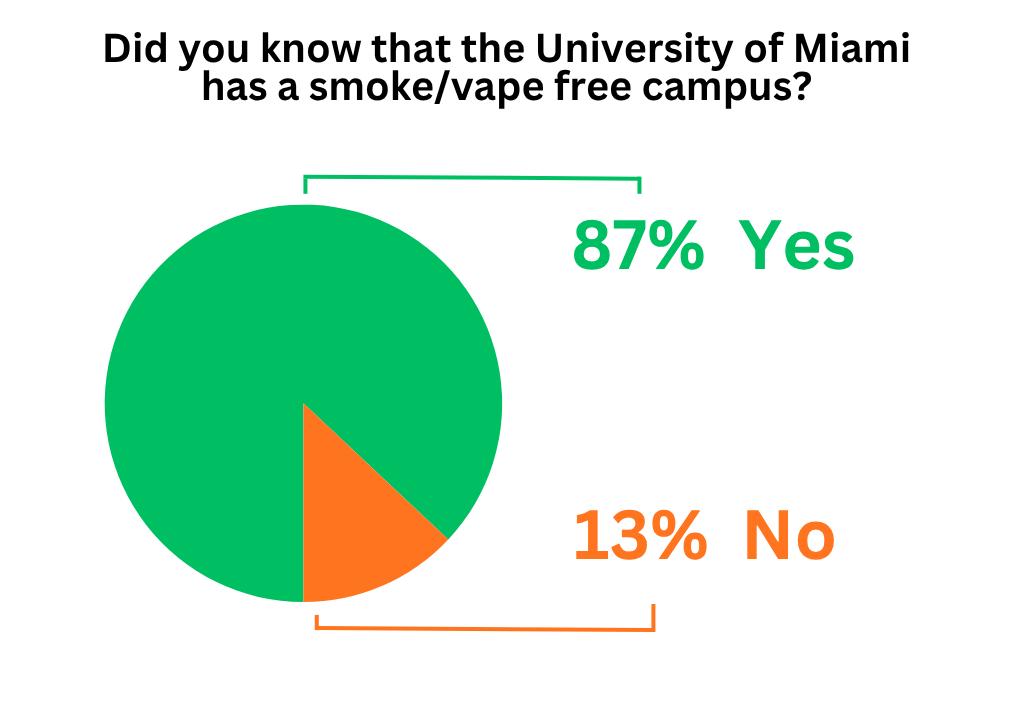
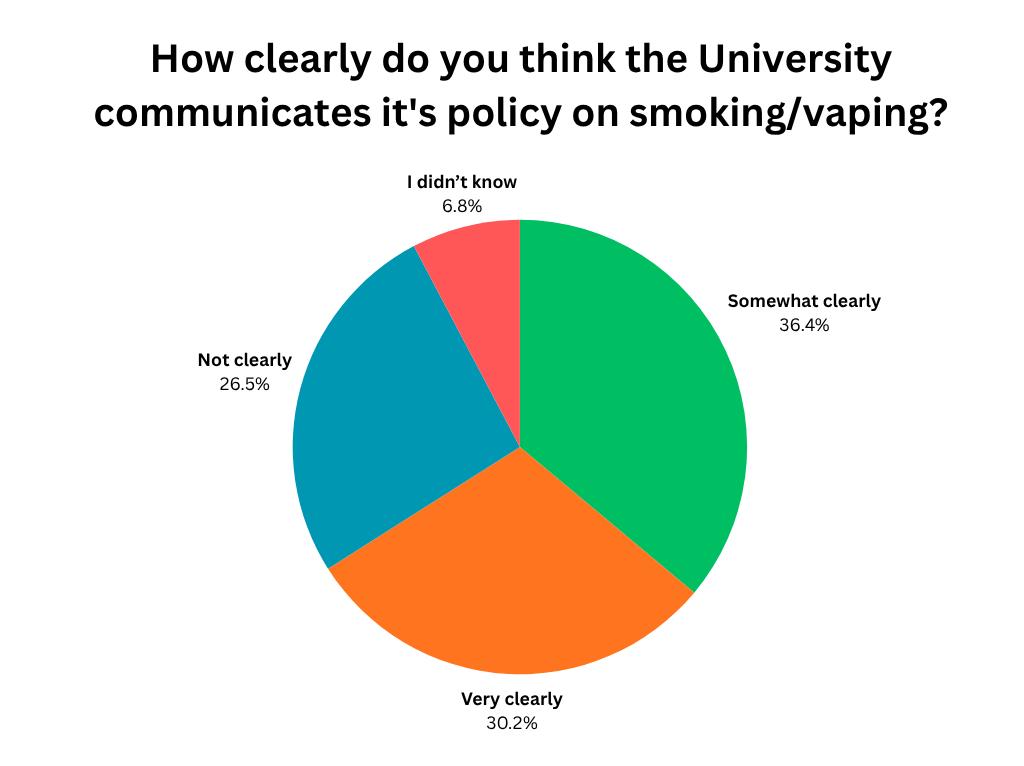
help students who want to quit vaping but are struggling.
On campus, students can visit a medical provider in the student health services. Smoking cessation aids are available free of charge to all students in the university’s student health center.
Students can also attend the University’s award-winning smoking cessation program, Tobacco Free Florida AHEC. This resource is available to UM employees, students, and the community at no charge.
The resources off campus include The State of Florida Quit Line, which offers free counseling and nicotine
“It’s nice that it’s on campus and [the IIFC] is integrated with a lot of professors that we already know and that we’ve worked with, but also it just has had a good reputation in the community,” said Maceira.
Although UM offers counseling services to students, Maceira says the IIFC can be a better long-term option.
“The Counseling Center does really good work, but from what we’ve seen they’re really swamped, and they can only do a few sessions,” said Maceira.
“If you’re a student that’s looking for something a little more long term … then the IIFC is a good alternative.”
Now, the IIFC is working to rebuild its clientele by promoting around campus and in the community to spread awareness about the resources UM offers.
patches. There are also many websites to visit with programs like My Last Dip, Kill the Can and apps like NCI QuitPal and Smokefree Teen QuitSTART.
When prompted with the question,
“What do you think could help reduce vaping on campus?” A response from the form stated, “Maybe more signs saying it’s prohibited around campus, I don’t think I’ve ever seen one.”
Some responses took the stricter approach like more patrol from RA’s, more cameras, and making the punishments more clear and firm.
One student believes a cultural shift is necessary to reduce the smok-
ing and vaping on campus. Others, like UM communications professor Elayna C. Paulk, feel that more education on smoking and overall reduced stigma are a step towards reducing vaping. Also more signs around campus as a preventative measure. “A policy that’s just like stuck on a wall is not going to really change perceptions on it. At this point, it’s so much of a habit that I think it’s so important for us to really address, ‘How do we make this not a habit,’” said C. Paulk. “We can all benefit from education, whether we use it or not, just so that we understand more.”
‘Porch pirates’ documented stealing packages at The Cloisters Miami
CONTINUED FROM PAGE 1
In 2023, a WSVN article covered the living conditions of several UM students living at The Cloisters whose bathtub, toilet, and sink were filled with feces and sewage.
“We currently have feces coming out of our kitchen sink, and we’re trying to get someone on it,” said Gianna, a resident at the Cloisters during the time the article was written, to WSVN.
The students also mentioned their closet door falling off its hinges, having no window shades or blinds and overall
feeling unsafe in their environment. An online rating website called ApartmentRatings.com currently has The Cloisters Miami at 2.2 out of 5 stars based on reviews.
“Absolutely awful establishment that should be shut down,” said one review from Current Resident 724593.
“The worst part is it isn’t a safe place to live,” wrote Current Resident 321299. The response from the Cloisters has generally been that they are “addressing complaints as quickly as possible,” but students are unsatisfied with management’s lack of action.
Lorelei DiSanto // Staff Photographer
The Lennar Foundation Medical Center, operated by UHealth, University of Miami Health System.
Jared de Monteiro // Contributing Designer

Nova Festival
survivor and Lone Soldier reflect on two years since October 7
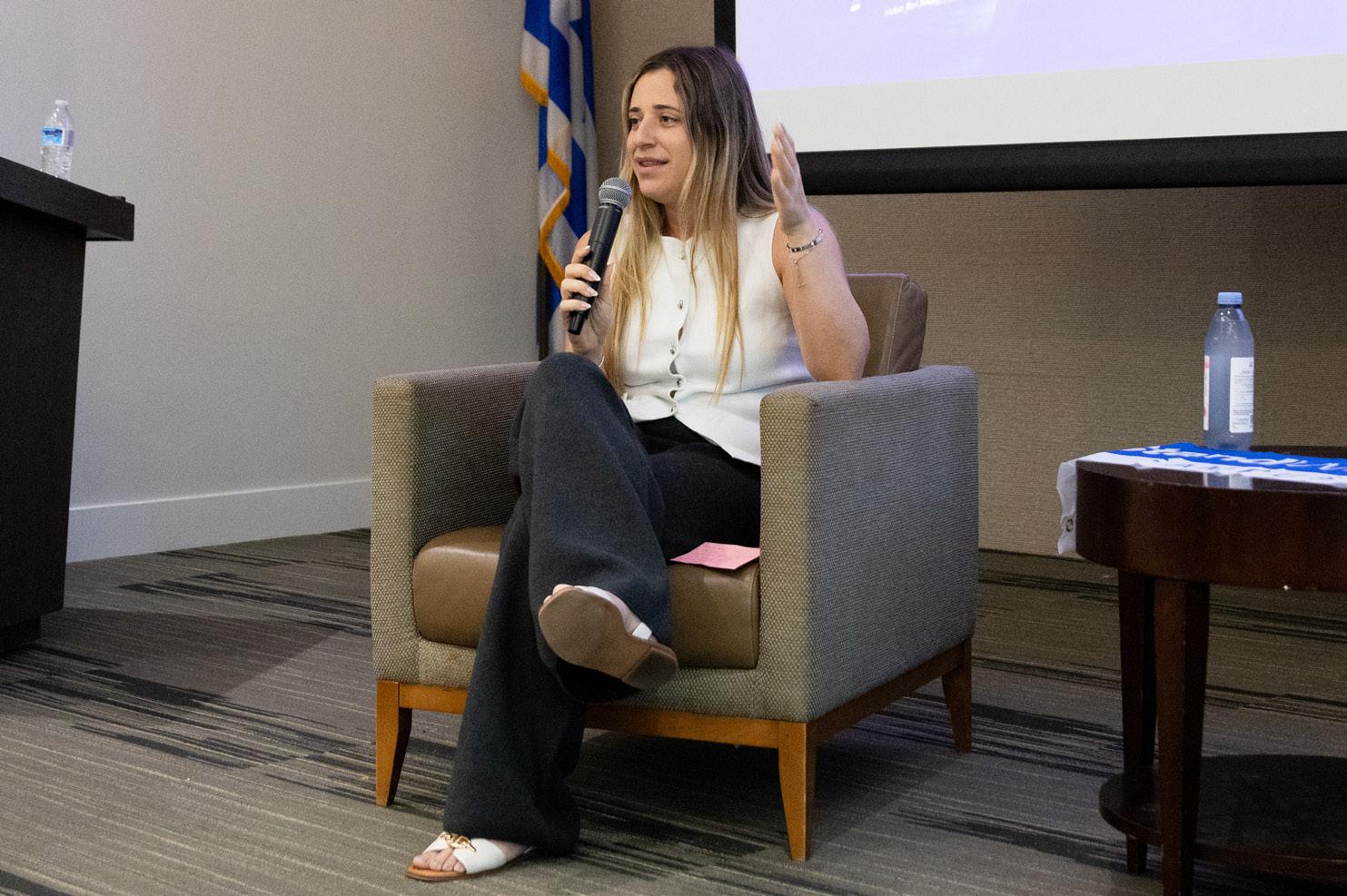
Student Senate looks to improve connection with UM community
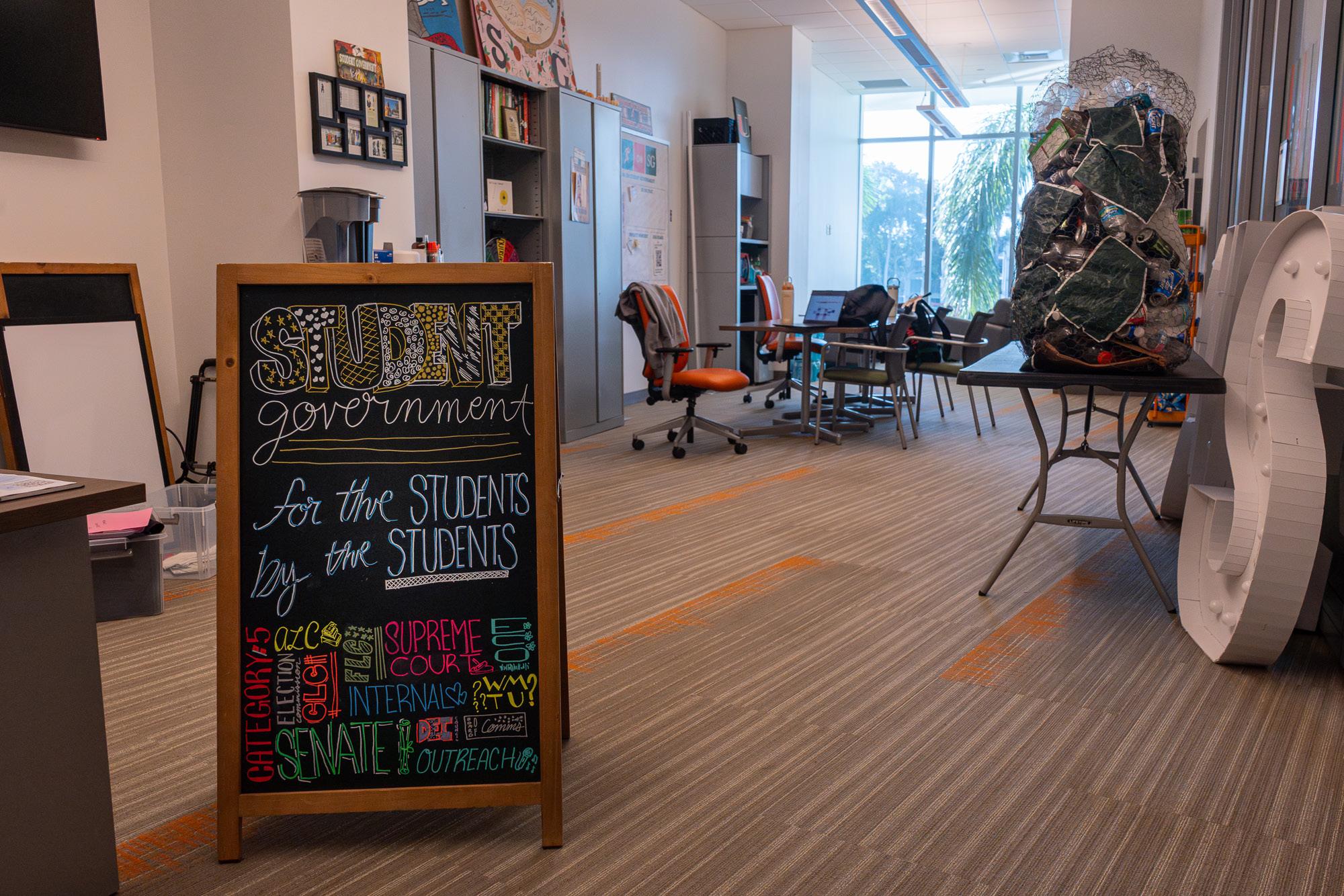
By Martina Pantaleon Senior Staff Writer
The Student Senate is currently working to increase transparency and visibility with the student body. Steps to expedite passing bills and finding new ways to reach constituencies are already in motion.
Senator Issa Romano passed a bill in September to add Americans with Disabilities Act buttons on doors in University Village to open them automatically. No one told her this was a problem, but she realized it and wanted to fix it. She wrote the bill and passed it faster than in previous years.
Previously, bills took months to be implemented. Members of the Senate attribute it to a lack of clear directions on how to work with the administration. Now, the Senate is creating a set of procedures that will incorporate changes to UM more effectively.
With the internal changes, Alexei Darling, Speaker of the Senate, hopes that each senator will be able to pass at least one bill per semester and represent their constituency better.
“Now, it’s more let’s create a system that gives people the structure that they need in order to build those things,” Darling said. “And I think a lot of the time, people in the Senate want to do those things, but there’s just been a difficulty with finding direction.”
With the elections for the 2025-2026 Student Senate complete, Darling hopes the new senators can already benefit from the efforts.
There is one main area the Senate is targeting with its newest bills.
“Career Services,” Darling said. “Having worked on it last year with administration and seeing what our employment numbers and internship landings were for students at the school, it wasn’t a great picture, especially for how good of an institution the University of Miami is.”
Expanding job opportunities for students and improving academic advising are not changes the Senate can do alone. Even if the administration is responsible for most of the work, Darling thinks the work they are doing is valuable.
“It’s a process that takes time, and sometimes you need some student voice and student input to kind of see how that gets shaped a little bit,” Darling said.
The Lakeside food pantry was empty on Sept. 4. To find a solution, Ate’sia Wallace
perspective of life, especially after having lost several close friends.
“I’m a person with a faith. So don’t think too much. If you want to do something, go and do that. And if you just want to say something for someone, don’t think too much, because the life is so short,” said Asner.
Luke Cohen, UM junior, reflected on his time in Israel this past summer, having visited the Nova site and met several individuals directly affected by Oct. 7. “I could picture the places we went, all the smiling faces, the happiness, and the excitement that were taken away in moments,” he said.
attended the Student Senate’s open forum on Wednesday, Sept. 10. Now, the student senators are drafting a bill to help prevent food scarcity among students.
Cases of students reaching out like this are not as common as senators would like. To make changes that matter, senators need students to reach out.
Darling and other members of the Student Government blame the difficulty in connecting with students on a lack of transparency and visibility.
“We do a lot of work, and we try and make a big effort to do good things, but we don’t do a great job of advertising [their initiatives], so we’ve been trying to do a better job doing that,” Darling said.
Having more tabling events is one solution. Its most recent event in September, “Food for Thought,” was held to discuss improvements to housing. But most student engagement comes from Student Government’s weekly meetings.
“People are free and allowed to come,” Darling said. “We want our constituents to be more involved.”
Students are invited to talk to senators during Open Forum every Wednesday from 4:30 p.m. to 6:30 p.m. in the Senate Room on the third floor of Shalala. If someone cannot attend, senators are working to connect representatives with their constituencies.
“I did have an idea for a bill where we would send out emails to our respective constituencies and the advisors or directors for our respective constituencies,” Elizer Rozado, first-generation student senator, said.
The Senate’s Public Relations Committee is working on Rozado’s proposal.
Another initiative has been Senate Takeovers. Students can get to know representatives from different constituencies by following them for a day and asking questions.
The Speaker for the Senate, Alexei Darling, and his Speaker Pro Tempore, Trinity Vodovoz, can be contacted at speaker@ miami.edu. If students want to know more, they can look over their website and Instagram pages.
“I want to emphasize that the senators do a lot of work, and they want to hear from you guys,” Darling said. “Go talk to them. Go give them these ideas. Talk to them about your issues so they can work on them, because they want to improve student life for everyone.”
decides to take another five with them, and they go and confront the Hamas soldiers,” said Pritzker. “These are people eighteen, nineteen years old, four months in the army, and they kill the three Hamas soldiers. It’s an incredible story.”
After returning to Israel on one of the first flights back, his service continued.
Pritzker explained that the goal of his service was “just trying to keep the peace” between Israeli civilians and Palestinian civilians. He was on guard in the West Bank and other fronts and used intelligence from spies to identify Hamas members.
More than 130 students and staff joined together in reflection and remembrance at UM Hillel to commemorate the anniversary of the Oct. 7 attacks. Nova Festival survivor Rotem Asner and UM student Eitan Pritzker, a former IDF lone soldier, shared their experiences on and after Oct. 7 with those in attendance.
“I always say that today is my birthday because this is exactly what I get — this is a gift. I get my life again,” said Asner, UM Hillel’s Israel Fellow. Asner, who is from the south of Israel about 30 minutes away from the Gaza border, studied to be a physical education instructor. After the attack, she decided to pivot and come to UM Hillel as an Israel Fellow.
“It was after that I decided to do something more meaningful,” she said. “I’m so happy to be here today.”
While sharing her story, Asner recalled arriving to the Nova Festival with her friends, setting up their campsite, and going in to dance.
“I remember that Sharon, my best friend, she saw something in the sky,” said Asner. “She said she can’t even explain what happened. She just saw thousands of rockets.”
From there, Asner’s group got into their car and attempted to drive, only to see the chaos of thou-
sands of other partygoers evacuating. When they got out of the car to walk, she recalled hoards of people running, suddenly understanding the gravity of the situation.
“Everyone just started running, and I just stopped, and I saw two terrorists come my way with two guns,” Asner said. “And it was very nonchalant because they know what they’re going to do. They come to kill us just because we are Jewish.”
Freshman Rachel Katoni said hearing these personal accounts made her reflect on the fragility of life.
“Hearing from individuals who survived such horrific events made me reflect on how fragile life is and how quickly these ordinary moments can turn into chaos,” said Katoni. “As a college student, it resonated with me as I was imagining people around my age experiencing something so devastating,”
After trying to run, Asner found herself in a car of other festival-goers, having been separated from her friends, and they decided to drive out from a different road, with no clear indicator of a safe exit.
“This is the decision that saved my life.” Asner said. “It’s you take a right to the terrorist, or you take a left. You don’t know where is the terrorist because every place in this area, it’s with terrorists. We took the left side. I don’t know why. God helped me. I really, really believe this.”
Her faith shows in how she speaks of her new
Cohen also spoke to the importance of relying on one another to find strength in community.
“They are here today and telling these stories because they leaned on their communities and their communities leaned back,” he said. “We have an opportunity to take these messages and share them with our communities to both strengthen them and live with hope that each day will be better than the last.”
Also speaking was Eitan Pritzker, a UM student from Atlanta who enlisted in the IDF as a lone soldier prior to Oct. 7. He reflected on his time in training and the bonds he fostered with his platoon of both Jews and Druze.
Pritzker drafted into the IDF in 2022 as a lone soldier — someone who does not have family in Israel. He learned Hebrew for three months as part of the lone soldier process. Following training, Pritzker served in the Search and Brigade unit. Their team responds to disasters around the globe.
“It’s essentially our job to save lives,” said Pritzker. “If there’s an earthquake anywhere in the world, Israel sends a team, and that’s us,” he said.
A year into his service, he had the opportunity to visit his family in the United States. On October 7, 2023, he received a call describing what was unfolding across the world. His base, Zikim, was under attack.
“Hamas soldiers got into the base. So at this point, most of the commanders are dead. You have a bunch of trainees in a base with nothing, they don’t know what to do. And so one of the soldiers
Asner and Pritzker answered questions from the audience about the media controversy surrounding the war, where they get their strength to serve from and what makes them feel tied to Israel.
Ultimately their messages were of resilience, pride and strength.
“I will be unapologetically pro-Israel forever. I’m happy to share my experiences. I am very strong about my Judaism. That’s why I joined. And it doesn’t bother me. And it shouldn’t bother any of you,” said Pritzker.
At the end of the event everyone rose to sing Hatikvah, the Israeli national anthem, whose lyrics speak to the hope of the Jewish homeland — a hope of thousands of years that has not been lost.
Jayla Taub, UM senior said that the responsibility falls on students to continue sharing these stories out to the larger community.
“We are the ones who need to be speaking up, remembering, and sharing our voices and our light,” said Taub. “Events like these allow for us students to learn more from people’s personal experiences, and to get together and really feel support from a community that we are a part of.”
Asner hoped students left Hillel feeling empowered to take on the responsibility of bearing witness to these tragedies.
“Everyone here needs to share the story of the survivors and of Oct. 7, all the people, because this is the history of Israel, “ said Asner. “All of us, we have something to connect with. This is Israel.”
Brian Mulvey // Co-Photo Editor
A sign sits at the entrance to the Student Government suite on Monday, Oct. 20, 2025.
Daniella Krasney // Contributed Photo
Nova Festival survivor and UM Hillel Israel Fellow Rotem Asner speaks about her experiences during and after the Oct. 7 attacks at UM Hillel on Oct. 7, 2025.
By Alana Cowan Contributing Writer

UM’s heat problem: Making the sun less fun
By Peter Kellogg Contributing Writer
Students, faculty and staff kicked off this semester while exposed to extremely hot weather. According to the National Weather Service, August had over 25 days reaching 90 degrees or more across Miami. Constant exposure to extreme heat can threaten student health considering it can worsen episodes of stress and tension — a far too common occurrence as a result of schoolwork and balancing extracurriculars.
The University sparsely advises students to avoid the negative effects of extreme heat by sharing educational content on its wellness center website, but it is not enough to ensure safety and comfort across campus. In addition, the University needs to mandate certain heat precautions and improve the management of water refilling stations on campus.
First, executive administrators should create a heat stress policy similar to University of Florida’s.

Managed by the UF Department of Environmental Health and Safety, this heat stress policy holds every department accountable for implementing heat precautions, training for heat stress symptoms, providing easy access to clean drinking water and adjusting work schedules to reduce heat exposure during extreme events. Most importantly, UM has a similar organizational structure as UF and also has an Environmental Health and Safety department suggesting the introduction of such a policy would certainly be feasible.
In addition to updating the rulebook, the University needs to make physical changes on campus. On hot days, open spaces with unshaded pavement heat up the air around it, becoming dreaded parts of a walk to class. Comfortable lounge and study areas, such as Lakeside Patio or the court yard in front of Cox Science, become toaster ovens due to the large amounts of the unshaded heat-radiating concrete.
Temporary canvas shadings or tented

walkways around campus during hotter months could be a legitimate solution. This temporary shading could be in school colors, adding to campus spirit especially during an exciting football season. Innovative installments like solar powered cooling fans should also be considered — these could even provide an eye-catching stop on a campus tour.
Most importantly, hot days require hydration. Yet, many fill-bottle stations on campus either don’t work, are extremely slow or show a red light indicating the need for a filter change. These obstacles become a nuisance, disincentivizing students from using these stations which lead to purchasing plastic water bottles instead.
The Miami Hurricane reached out to the University’s administration for an official statement regarding their efforts for heat precaution.
“Drinking water refilling stations can be found in many buildings on campus, providing easy access for the com-
munity to remain hydrated throughout the day,” said the University in a statement to The Miami Hurricane.
However, it is clear that these essential stations are not monitored. This situation is a simple fix that university administrators and student government should be on top of.
While there seems to be a lack of common ground, the University has demonstrated consistency for certain vital services which help deal with the heat. Primarily, these services are air cooling systems within university buildings and the Hurry ‘Canes shuttle buses.
Additionally, the University does well planting and maintaining trees — earning its 11th designation as a ‘Tree Campus’ by the Arbor Day Foundation this past year. Trees can protect us against the heat by shading walkways and the cooling effect of evapotranspiration, pulling water through their roots and evaporating it through their leaves.
Lastly, the University’s Student Health
Department has contributed to heat precautions by featuring an extreme heat precautionary guide on its home page.
“On campus, every effort is made to provide a safe and comfortable environment maximizing shady areas for the University community to enjoy and seek out during hot weather, which is very much a part of the South Florida experience,” the University said. The attitude that students chose Miami knowing its climate is shared by many, including the University. However, not every student or staff member has the same ability to tolerate high heat frequently.
Weight, age and medical conditions can affect tolerance and risk of experiencing an extreme heat illness. UM has a responsibility to ensure campus is a safe space for everyone who is either a student, employee or volunteer. These solutions are not all encompassing, but important proposals the University should consider.
There are no winners or losers in freshman housing


By Birdie Church Contributing Writer
Closer walks to most classes, non-communal bathrooms, more socially connected floors, and Glen’s greeting at the dining hall. These are all things that the Mahoney-Pearson Residential Colleges bring to the table. The freshman community at UM is greatly divided into two groups: Mahoney-Pearson and Centennial Village. While the system for who got which dorm was completely random, the residents have seemingly been categorized as the students who “won” and got Centennial. Those who got Mahoney or Pearson are not the losers. What
Mahoney-Pearson lacks in sterile, hotel styled rooms, it makes up for with character and community.
As someone who has lived in 11 houses throughout my life, I always had a checklist when picking what room to live in. My priorities were always set on the room’s size, my own bathroom and the closet size.
Centennial’s rooms are 200 square feet, compared to Mahoney/Pearson’s which are 240 square feet. There is also a more evident choice when it comes to the bathroom situation.
Mahoney-Pearson’s bathrooms offer complete privacy, with space to leave your toothbrush, hair products and body wash. The location of the bathroom being a couple steps from
No more ubering Let freshmen park on campus
By Hannah Valdivia Contributing Writer
If you’re a freshman like me, then you’re probably tired of having to take an Uber to the nearest Trader Joe’s or Target just for a roll of toilet paper.
Yes, I could walk or take the Metrorail, but it would be much easier if I could park my car right outside of my Pearson dorm room. Freshmen should be allowed to park their cars on campus, and I’m not the only one who thinks so.
“It’s so stupid that we can’t park on campus,” said freshman Hannah Salles. “I spend almost $50 a week on Ubers, it’s insane. I’m just trying to buy my groceries.”
The new Publix might be within walking distance, but most freshmen-frequented places are not. The average student spends between $40100 on Ubers in just one week. When you multiply that by four, you get up to $400 a month just on transportation costs alone.
”I easily spend like $60 on Ubers in one night. It’s ridiculous, especially with how expensive this city and school already is,” said an unnamed freshman. Parking is already tight as it is, but with UM’s tuition being nearly $32,000 a semester, it should have the funds to build another parking garage in place of some older residential colleges to get freshmen off the Uber-train and put some money back in their pockets.
bed is supreme for brushing teeth on late nights, and is a major time saver for mornings when you are almost late to class. In contrast, Centennial’s bathrooms are communal, meaning not only can you not leave personal items there, but also you will never know the condition of the bathroom before walking into it.
Sophia Clark, an Ibis resident, said that Centennial’s location is not always the most convenient.
“I like that it is located closer to the gym, because if I lived in Pearson I don’t think I would be as motivated to go, but it does suck because it’s far from my classes” said Clark.
On the other hand, Pearson resident Shannon Brickley loves living in
Miami is a big city, and not an easily walkable one. I should be able to use my car whenever I need it, and not have to pay $20 to ride with a stranger, spend $50 to $100 on groceries and then another $20 on the ride back to my dorm.
As a girl, taking an Uber alone can be scary or uncomfortable. I shouldn’t have to wait for friends to go somewhere or ride back when I’m ready to go home.
According to a New York Times article, cases of sexual assault or sexual misconduct were reported on 400,081 Uber trips between 2017-2022. While the reality is scary, it is something that most college girls think of the moment she steps into her Uber.
Freshmen could resort to using Freebee instead. However, the service only takes you to certain areas around campus and does not beat the luxury of having a car whenever you want it.
“The policy to restrict on-campus parking for first-year students was implemented — with the support of
Mahoney-Pearson specifically for the proximity to her campus obligations.
“I love the location because when I accidentally sleep in too late, I have such a short walk to class, and to be honest I don’t mind the walk to the gym, I use it as a warmup of sorts,” she said.
Brickley also appreciates the community she has built in Pearson and doesn’t feel that her friends in Centennial benefit from the same built-in social scene. She detailed how she is close with all of the people in her hall and how she feels welcome to walk into her neighbors’ rooms at any time.
“I love that my floor is social and that there is a huge community within the dorm. A lot of my friends in Centennial have said that they don’t get that
Student Government — in the early 2000s,” the University of Miami said in a statement to The Hurricane. “The goal is to maintain safe, accessible, and well-regulated parking for everyone across campus.” If UM really wants to make parking safe and accessible for every single student on campus, then freshmen should also be considered. If I want to go on a late-night Taco Bell run or go shopping outside of the radius that Freebee offers, I shouldn’t have to pay a crazy amount of money. Rather than leaving students stranded, the University needs to provide parking options for students on or around campus. Freshmen should not be overlooked when it comes to providing students with “safe and accessible” parking. We need to be given the opportunity to travel safely both across campus and the greater Miami area, and that starts with allowing us to have cars and park them on campus.
feeling in their hall,” Brickley said. Despite not loving her walk to class, Sophia still prefers living in Centennial because “it just feels fresher, like the air feels cleaner.”

Brian Mulvey // Co-Photo Editor Pearson Residential College stands in the sunshine on Oct. 20, 2025.
Marra Finkelstein // Contributed Photo Centennial Village welcomes its first residents on Aug. 12, 2024.
Brian Mulvey // Co-Photo Editor Cars sit parked in the Mahoney Pearson parking lot on Oct. 20, 2025.
Lions & Willows brings sustainable swimwear to UM

By Skyla Thomas Contributing Writer
Jade Abramson, a senior at UM, transformed an idea born in quarantine into a growing business. Her swimwear brand, Lions & Willows, combines sustainability, femininity and strength to reflect her creativity and entrepreneurial drive.
“L&W is a feminist and sustainable brand,” Abramson said. “The willow tree represents feminine energy, so I thought that tied together our two missions nicely.”
Abramson first envisioned Lions & Willows when she was 16 while quarantining in New York City during the COVID-19 pandemic. With time on her hands, she began sketching swimsuit designs and researching fabrics, unknowingly laying the foundation for what would become Lions & Willows. By the time she arrived in Miami, that fascination had become a concrete business plan.
“I came to Miami in order to start the brand,” Abramson explained. “But Miami has definitely impacted how it’s grown over the past two years.”
It is easy to see the city’s influence. The beaches, color and constant warmth of Miami are reflected in the designs. Each collection feels curated for a confident, coastal lifestyle while maintaining a commitment to sustainability and ethics.
Behind the scenes, the brand runs on values as its aesthetic. Its bikinis are manufactured in Bogota, Colombia, by an all-women team over forty years old. This was a strategic decision Abramson made to support female employment and fair labor. “It was important to us to work with a manufacturer that shares our values,” she said.
The brand also uses recycled fabrics, low-fuel transport methods and an upcycling program to minimize environmental impact. Customers can turn in old bikinis, which are then carefully deconstructed and remade into new designs. The process turns old pieces into fresh creations while offering to receive 10% off their next order from L&W.
The initiative creates a cycle of creativity and accountability, giving customers a chance to participate in the brand’s values. “We want people to feel like they’re part of the brand’s mission, not just buying from it,” Abramson said. When asked why she chose to invest in sustainability instead of expanding production, Abramson didn’t hesitate. “I’d rather grow slower and do it right,” she said. She feels that fast fashion moves fast, but that is not the point of her brand.
Balancing entrepreneurship with academics has been another challenge Abramson said she’s grateful that her major allows her to merge coursework with her company’s goals. Some of her entrepreneurship classes double as project opportunities to test new strategies for Lions & Willows. “It’s hard,” she admitted, “but having that overlap keeps me focused and helps the brand evolve.” Still, visibility remains one of her biggest obstacles. She spends countless hours shooting content, managing collaborations, and growing the brand’s online presence. “The hardest part has been getting the brand out there and having people discover us,” she said. Abramson has leaned on social media to build awareness, with Instagram, TikTok and pop-up markets driving most of her exposure.
Looking into the future, Abramson sees Lions & Willows growing beyond swimwear with hats, claw clips, cover-ups and a men’s swim line.
Lions & Willows wants to create swimwear for everyone, but is having trouble reaching everyone. Abramson follows her business mantras to push past that doubt and create a one-of-akind sustainable swimwear brand.
“Be confident in yourself and your idea,” Abramson said. “You’re the only one who can make your visixon come to life.”
Lions & Willows is the result of Abramson’s persistence and purpose. What started as a concept has evolved into a brand with momentum, proving that even small ideas can grow into something lasting when treated with conviction and care.
Nikki Pindor has your attention
CONTINUED FROM PAGE 1
She knows exactly when to stir things up, and it never fails.
“The frat cooking video was pure ragebait,” Pindor said. “I knew people would get mad, and it worked.” The clip showed her cooking alone in a frat house kitchen, sparking mixed reactions online from students who called it cringe and embarrassing. “Yes, I was there alone. Yes, that’s true. But like, I cooked for myself,” she said.
Then came another viral stunt. Pindor made it look like she was flashing her way into a club by lifting her shirt in front of bouncers in a TikTok video. But she really revealed another shirt she had underneath that read, “I heart bouncers.”
“Honestly, it was kind of a social experiment,” she said. “I wanted to see how bouncers would react — and it worked, I got in.”
But not everyone found it funny. The clip spread fast, earning her a meeting with the dean after someone reported it to the University.
“I got a bunch of backlash for that one,” Pindor said. “People thought I was actually flashing them.”
On YikYak, posts debated whether she’d crossed a line. Some posts defended her, others tore her apart. As always, she brushed it off and kept posting.
What makes Nikki so watchable isn’t just the chaos of her videos, it’s her stamina. She posts herself coming home at 5 a.m. on school nights and still making it to her 8 a.m. lectures. It’s not a one off either, she does this multiple times a week, leaving everyone wondering when she studies or sleeps.
Pindor’s schedule itself has become part of the spectacle: nights that stretch until sunrise, mornings in Cox, TikToks dropping every few hours and a flood of brand emails to answer between classes. Even her finances have become a subplot.
She’s already putting cash into index funds, bonds and bitcoin thanks to some investment advice she got from Reddit.
While the money is good now, she isn’t betting her future on it.
“Obviously, I’m going to stick with school. Because anything on social media comes to an end,” Pindor said. “I need stability, so I’m going to stick with something I know will provide me with a stable career in the long term.”
That commitment aligns with her 4.85 high school GPA, seven advanced placement courses and top exam scores.
Pindor is chaotic, exhausting and undeniably impressive and maybe that’s why people can’t look away.
Pindor is pulling off what every UM student dreams of: steady paychecks, passing grades and a social life that never leaves South Beach. Of course, the same things that make her viral, also make her vulnerable.
Most of us can wander into the dining hall for a snack between classes and vanish into the crowd. Pindor can’t. If she steps inside, someone is bound to snap a picture.
“I literally put on sunglasses and tied my hair back once, just to get a cup of fruit,” Pindor said. “Six minutes later, I was on YikYak with the caption, ‘You can’t hide from us.’”
She’s good at laughing it off, but the
Colette Couillard makes an impact
CONTINUED FROM PAGE 1
Brand partnerships have become a part of her everyday life. She’s worked with major brands like DoorDash, Best Buy and Ulta Beauty. Couillard says these collaborations help fund her tuition and even let her go to New York Fashion Week.
At fashion week, Couillard met Ashtin Earle, the sister of UM alum Alix Earle. Couillard says that Earle sisters are some of her favorite influencers, and even though she has wanted to come to UM since middle school, seeing Alix posting about how fun the school was influenced her in the long run.
She looks up to Earle’s success and sees her as a role model for the impact she would like to leave on campus. With her growing following, Couillard recognizes that she is starting to become a role model to her more than half a million followers.
“I went to the Olivia Rodrigo concert and there were little girls coming up to me, and one girl was crying and I didn’t know that I had that effect on younger kids,” Couillard said. “Just knowing that young girls are watching me too is just really special.”
Couillard makes it a point to keep her online presence authentic, but she also recognizes that it is okay to want to keep certain things for yourself. She credits her par-
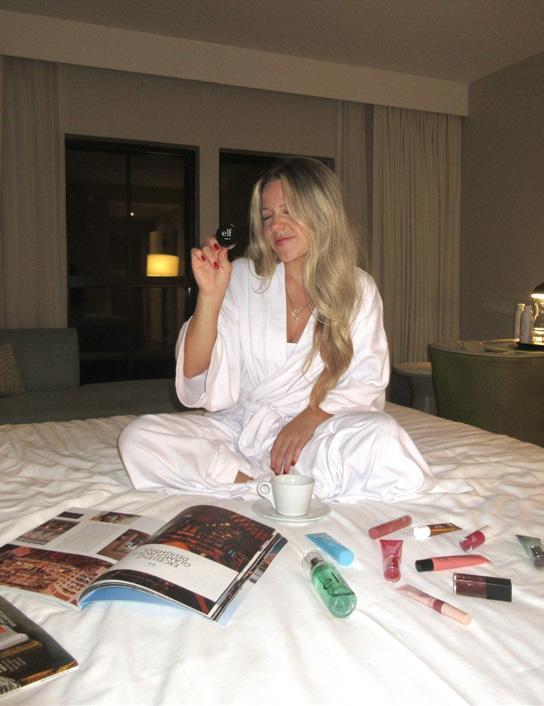
ents for giving her support growing up to be able to let any hate roll right off her back.
“I post almost everything, but my relationship is something that I keep private,” Couillard said. “I just don’t want to hear people’s opinions on that at all.”
As for her future, Couillard plans to graduate early and hopes to pursue a master’s degree in business law or political science. She puts her studies first, because she knows social media is not always going to be there.
“I could lose all my followers tomorrow,” Couillard said. “So I’m making as much money as I can now, investing in my education and seeing where it takes me.”
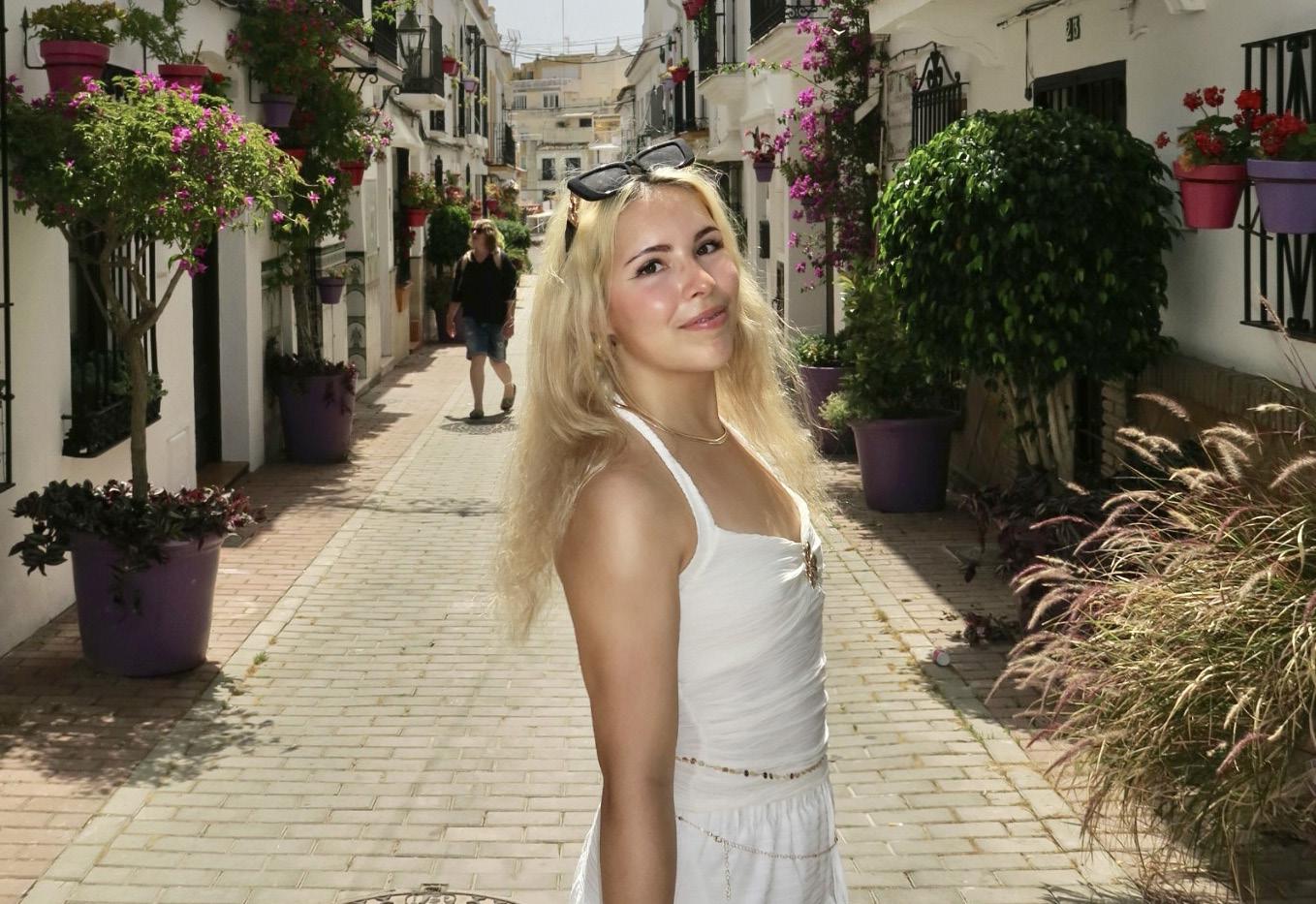
attention can still feel suffocating.
“I feel self-conscious everywhere I go now,” Pindor said. She still appreciates the positive interactions. “I love when people are nice and come upthat’s nice, that’s fun. But sometimes they’re not.” At a frat party, two girls shouted at her to get out. On YikYak, strangers speculate about her love life, even posting a blurry zoomed in photo of her walking with her manager and calling it a date.
“It wasn’t a date,” Pindor said, laughing. “I was literally going to a meeting.” Moments like that are constant reminders that being Nikki means living under a microscope.
Even wilder was the rumor that she’d been blacklisted from medical school.
“I’m like 99% sure I’m not actually blacklisted,” she said. “It was just a Yik Yak rumor. At first, I totally panicked
but then some actual doctors messaged me like, ‘Girl, med schools don’t blacklist college freshmen unless you commit a crime or something.’”
Even so, the idea that real adults might be watching was a wake-up call.
“It’s kind of scary realizing that people on the medical board might be seeing my videos,” she admitted.
Pindor takes all of these negative comments in stride.
“Even if you’re the kindest person out there, you’re still gonna have to deal with rumors and hate. You just have to be mentally strong,” she said. “It comes with the platform.”
That strength is what carried Nikki through the chaos. The 5 a.m. nights, the YikYak rumors and constant eyes on her. It’s what makes her more impossible to scroll past. Whatever comes next, one thing is certain: everyone at UM will be watching.
Julia Thomas keeps it real CONTINUED FROM PAGE 1
While Thomas shares a lot of her fun experiences on her platform, she makes the college experience as a whole a large part of her content. She gets vulnerable with her audience, even discussing the difficult parts of college like navigating homesickness and having a long-distance relationship.
So far, she has found the academic transition to be pretty smooth due to her strong time management skills from high school cheerleading. She notes the importance of staying organized since professors aren’t as handson as high school teachers.
Despite the negative public opinion about the longevity of her relationship, Thomas shares how positive long-distance has been going for her so far.
“Long distance has actually strengthened our relationship because we have so much to talk about now,” Thomas said.
Her advice for other couples going through a long distance relationship is to communicate daily in fun ways like planning FaceTime dates, making time for visits and not viewing talking as a chore.

While balancing being a creator and college student may seem like a lot, she has a good handle on it.
“My plan is just take it day by day and post whatever I’m interested in. I don’t think that stressing about it or getting burned out is what I want to do.”
Thomas uses social media as an outlet for creativity and building a safe and supportive community.
“I just want to have friends and a community that makes me feel safe,” said Thomas. “If you don’t like me, that’s okay — I’ll find my people.”
Social media is not an end-allbe-all for her, and ultimately she is at UM to get a degree and have a fun college experience. Thomas is currently studying business undecided, but has a strong passion for wellness and hopes to explore something in that field.
UM freshman Zach Yadegari helps more than 10 million people stay fit
By Keira Faddis Co-Opinion Editor
Before even stepping onto UM’s campus, Zach Yadegari was running a multimillion-dollar startup. His app, Cal AI, has been downloaded more than 10 million times and brings in millions of monthly revenue. And he’s just getting started. Yadegari was seven years old when he began coding. By high school, he had created his first successful gaming website and sold it for $100,000, so he was no stranger to startups when he co-founded Cal AI.
Cal AI is a calorie counting app that utilizes artificial intelligence to do the hard work of manually inputting information for you. There are two subscription options, where users can pay either $9.99 per month or pay for a year in advance, averaging to $2.49 per month. With a subscription, users can track their weight, measurements and nutrition goals, as well as track water intake and exercise.
Yadegari went viral earlier this year after posting his college rejection results on X. His post reached more than 28 million people — including the
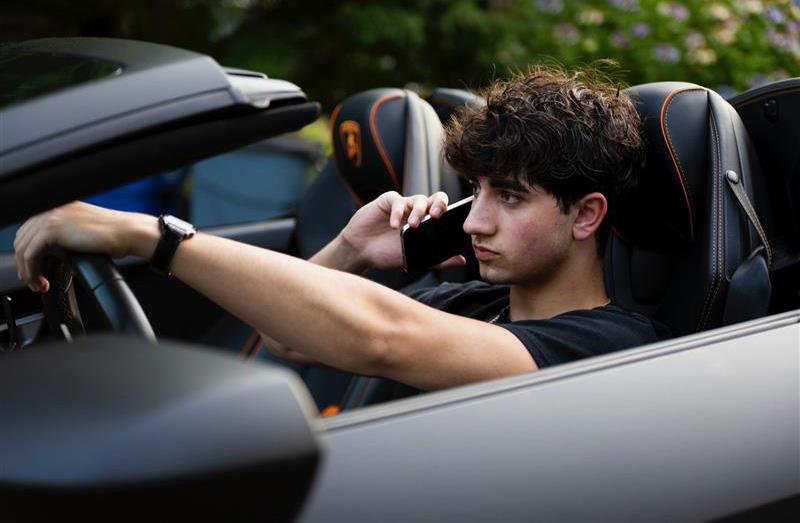
mayor of Miami — for being turned down by every Ivy League school despite his competitive resume: a 4.0 GPA, 34 ACT score and a multimillion dollar company.
“At that point, I decided if I’m not going to go to the best place academically for startups, then I’m going to the best school socially — and that’s the University of Miami.”
He created Cal AI after trying out other calorie-counting apps during his freshman year of high school.
“I learned pretty quickly that the
best way to actually put on weight isn’t by working out. It’s really in your diet,”
Yadegari said.
“So, I started to track my calories with one of the most popular apps at the time, but it sucked.”
That’s when he decided to collaborate with a friend, Henry Yangmack, to build something that helps people reach their fitness goals even if they don’t have time to put every ingredient from their meals into a tracking app.
“When all of these new AI tools started releasing, I had the
ly and friends loved the app even before they created the final version. They knew Cal AI was going to be more successful than anything they’ve made within days of its launch. After its first month, Cal AI brought in $30,000. Yadegari said he was cautious of telling everyone he knew about the app’s success, so he kept it a secret. It got harder to hide the $150,000 rolling into his bank account by the second month.
Building off that initial success, Yadegari and Yangmack moved to San Francisco for the summer. They worked tirelessly to keep the app moving by living in their office and hiring their first employees.
“We spent every waking hour of the day in front of our computers, working on this, and just making it great,” Yadegari said. “I think that’s really where the momentum really started to just fly.” Their work has paid off, literally.
Portrait Courtesy of Nikki Pindor
Portrait Courtesy of Jade Abramson
Portrait Courtesy of Zach Yadegari
Portrait Courtesy of Colette Couillard
Portrait Courtesy of Julia Thomas
Let’s
talk about the Tea (app)
We all know the infamous tea app for “girls only” to help you get all the tea on the guy you’re talking to or the mysterious one you’ve seen around campus.
The idea? Genius. It’s basically a group chat for girls to share all the rumors and red flags. Why scroll through someone’s entire Insta when you can get receipts from other girls who actually know them?
For the guys who have no idea what
I’m talking about, the Tea app initially started as an app for girls to get information about guys they were going on dates with to make sure it was safe. Now that it has reached the college campuses, it’s going far beyond that.
To be able to download the app, girls must input their information and then
submit a photo of their face for the app to verify that they are a girl.
Now it is being infiltrated by guys who borrow their female friends’ faces to get approved on the app. So you literally can’t trust anything that is being said on there.
But, it’s hard not to when the guy you’ve been talking to has 27 red flags and upwards of five comments calling them a bop.
I even saw one Miami guy with 75 red flags and a comment saying “always innit.” Stay safe out there.
But don’t worry. The most male friendly feature of the app is it doesn’t let you take a screenshot, so they attempt to make it difficult to share information about the guys.
On a real note, they had to know the
credibility of the app was going to go down in flames. Yes, of course every girl is going to be honest about their last talking stage that screwed them over…
Even worse, some girls meet the demise of their relationships after finding their boyfriends posted on the app. I don’t know what’s worse, that or a “hey girly” text.
The app isn’t all that bad if people started to really use it to their advantage. Not only does it have the tea search page, but it also has a chat/advice tab and a tab where you can lookup someone’s phone number and reverse image search them.
All that aside, take every “warning” from the Tea app with a grain of salt and maybe stick to your own detective work from now on.
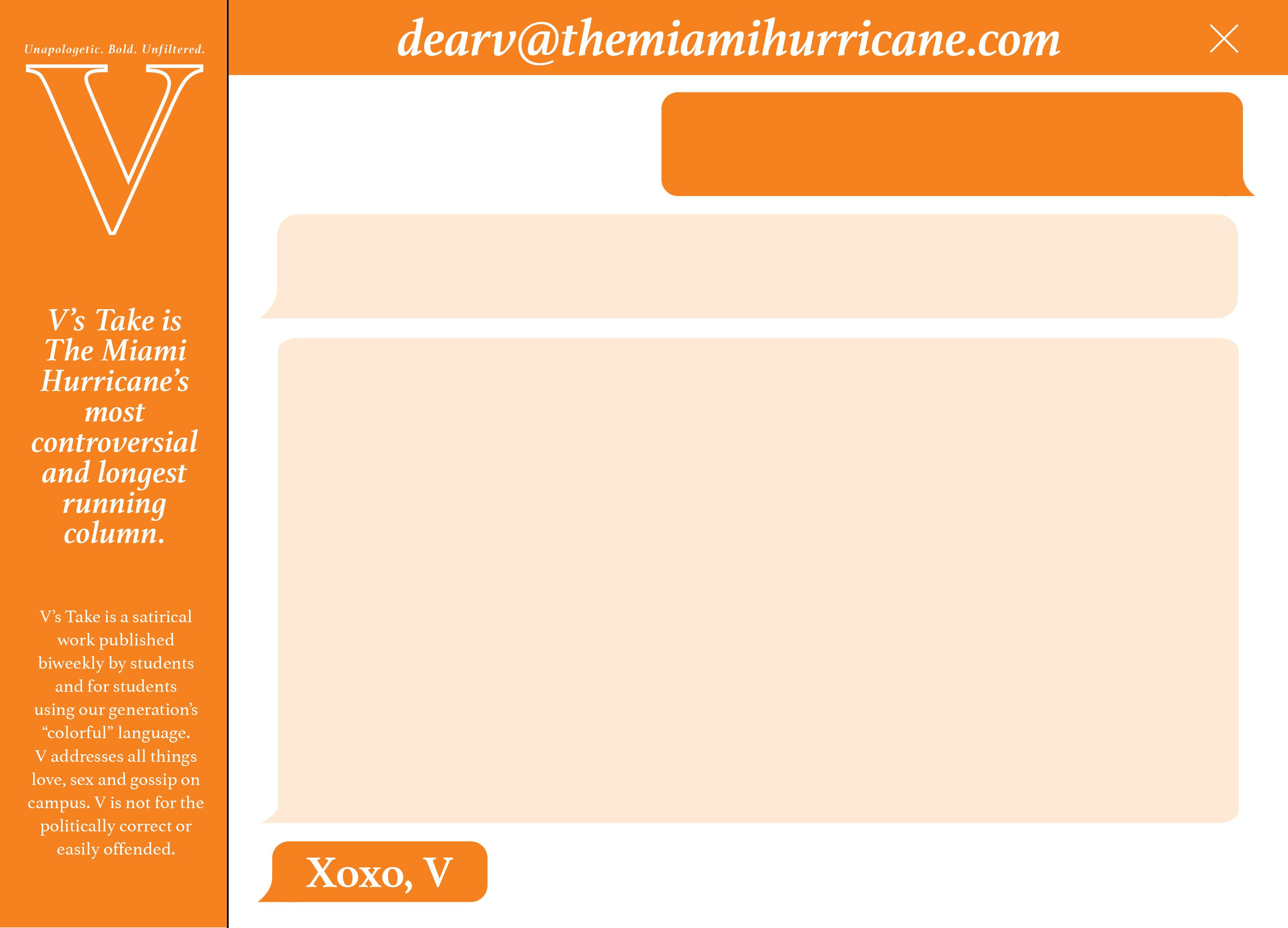
SPORTS
Beck’s fourth interception seals
No. 2 Miami’s 24-21 loss to Louisville
By Zach Cohen Senior Staff Writer
Down 24-21 with about four minutes to play, Miami was searching for a late score against Louisville, looking to tie the game or take the lead for the first time all evening.
With 36 seconds on the clock, Carson Beck and the Hurricanes drove to the Cardinals 31-yard line, putting UM in prime position to at least send the game to overtime.
On first down, Beck stepped back in the pocket and tried throwing the ball outside to tight end Elija Lofton. Defensive back Jojo Evans Jr. jumped the route and intercepted Beck, going quickly to the ground before running to the sidelines to celebrate with his team.
Beck’s fourth interception of the night sealed the deal as the No. 2 ’Canes dropped their first game of the season to the Cardinals 24-21.
“There was a miscommunication on the play and the routes that were supposed to be run,” Beck said.
Things originally looked bleak for Miami after Beck threw his third interception of the game on fourth down, giving the Cardinals the ball with eight minutes left and an 11-point lead. On the ensuing possession, the ’Canes were given new life.
On first down, Louisville quarterback Miller Moss pitched the ball out on the left side to Isaac Brown,
who fumbled the ball thanks to a big hit from Miami defensive back Keionte Scott.
The next play, true freshman Malachi Toney scored on an end around touchdown to bring the score to within five. On the two-point attempt, Toney threw a perfect pass to CJ Daniels to cut the deficit to three.
Despite the loss, Toney has put the rest of college football on notice as one of the premier wideouts in the nation. The 18-year old phenom hauled in nine catches for 135 yards, including a 61-yard catch and run.
Beck, however, played the worst game of his 2025 campaign. The sixth-year redshirt senior quarterback went 25-for-35 passing for 271 yards, throwing four interceptions and no touchdowns. An uncanny and uncharacteristic performance for the veteran quarterback that ultimately cost the ’Canes the game.
“There were times where maybe I was a little too aggressive and again it’s part of the game but we have to protect the ball better,” Beck said. “That can’t happen. It’s unacceptable.”
The Hurricanes (5-1, 1-1 ACC) got out of the gate slowly, which allowed Louisville (6-1, 2-1 ACC) to storm out to an early 14-0 lead in the first quarter. Miami had entered Friday’s contest trailing just once.
Penalties have been Miami’s kryptonite all season, which continued tonight. By the end of the game,
UM had nine penalties resulting in 68 lost yards.
“I’m disappointed in a lot of different aspects,” Miami head coach Mario Cristobal said after the game. “We gave ourselves a chance to tie or open the game but did not overcome all the issues that we caused ourselves.”
Louisville quarterback Miller Moss and wide receiver Chris Bell continued their strong connection, carving up the UM defense.
Bell finished the game with nine receptions for 136 yards and two touchdowns. Moss was an efficient passer on the night, going 23-for-27 with 248 passing yards and three total touchdowns.
Two of Beck’s interceptions came early, one which the pass was intended for triple-teamed Malachi Toney.
A drive later, Beck threw a ball to the left sideline that was picked off by Jabari Mack and intended for redshirt senior wideout Keelan Marion.
Miami remained flat footed on both sides of the ball through three quarters, which proved too much to come back from despite the late efforts.
The Schnellenberger trophy will travel back to Louisville and remain in its possession until at least the next matchup.
With this loss, Miami no longer controls its own destiny to make the ACC Championship. Both Virginia and Georgia Tech are undefeated in
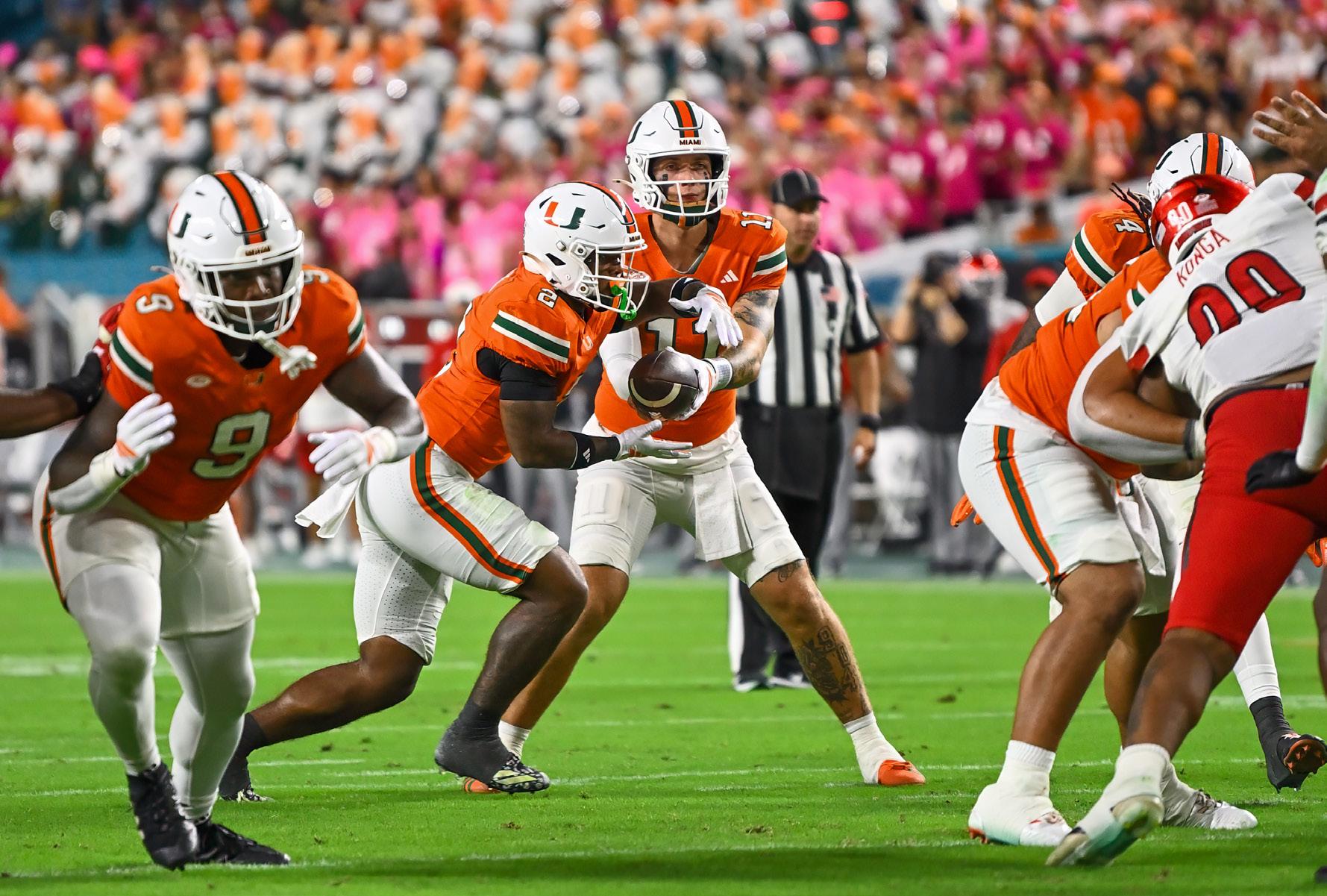

or Miami.

David Lebowitz // Staff Photographer
Sixth year redshirt quarterback Carson Beck hands the ball off to sophomore running back Jordan Lyle against Louisville on Friday, Oct. 17, 2025.
Brian Mulvey // Co-Photo Editor
The Schnellenberger trophy shines brightly at Hard Rock Stadium as the Hurricanes face Louisville on Friday, Oct. 17, 2025.
Brian Mulvey // Co-Photo Editor Freshman wide receiver Malachi Toney celebrates against Louisville on Friday Oct. 17, 2025.
On frozen ground, UM Women’s Hockey finds its fire

By Bella Armstrong Contributing Writer
At the Kendall Ice Arena, the home rink of the University of Miami Women’s Hockey team, the air is as charged as it is cold.
The players treat it like a temple, each other as family — it’s one of the most tight-knit, quietly revolutionary teams on campus.
Having recently been promoted to a Division II team under the American Collegiate Hockey Association, the upcoming season brings these Hurricanes skaters tougher opponents, official standings and more visibility than ever before.
But for the Hurricanes, that was never the whole purpose. This team isn’t just playing for points — they’re playing for people. What carried them to D2 classification isn’t budget or prestige, but rather the unbreakable sisterhood that comes alive every time the puck drops.
That bond is sacred to sophomore forward Alex Meola and junior goalie Ana Baurle.
“We’re the same person, just a different font,” Baurle says. “I’d do anything for her.”
UM Women’s Hockey brought these two together, and as they laugh together in the locker room, you might mistake them for having grown up playing together.
They met a week ago.
That kind of closeness isn’t a rarity on this team — it’s the culture. In a
How Mario Cristobal has rebuilt The U
By Omar Pinto Contributing Writer
At the turn of the millennium, Miami ruled college football. The choice was simple for recruits: play for them, or get beat by them.
But after their late 90’s to early 2000’s championship runs, the Hurricanes’ dominance and recruiting edge began to fade. Now, two decades later, Miami is clawing back with head coach Mario Cristobal leading the charge.
Miami’s downfall stemmed from a mix of factors, the first being their onfield performance.
While head coach Larry Coker’s tenure started out hot, it quickly cooled off. While Miami still landed top-tier talent, many recruits failed to meet expectations. Prospects who were almost guaranteed to be future Sunday stars like Willie Williams never lived up to their potential, hurting UM’s on-field performances.
From 2006 to 2021, Miami only recorded one season with double-digit wins and rolled through a carousel of coaches from Randy Shannon to Manny Diaz.
As their on-field performance dwindled, the identity behind The U went with it. This led local talent, which used to yearn to play at Miami, to start getting poached by powerhouse SEC schools, such as Alabama and Georgia.
In dire need of a jumpstart to their dormant giant of a football program, the Hurricanes brought in former player and master recruiter Mario Cristobal to lead the next generation of ’Canes.
Cristobal, a Miami native and ’Cane himself, was an offensive lineman at UM from 1989 to 1992, where he won two national championships during his tenure.
After a brief stint playing pro, Cristobal returned to The U as a graduate assistant, jumpstarting a decorated coaching career. His coaching career can be defined by one famous football phrase, made popular by his former coach Jimmy Johnson, “It’s not about the X’s and the O’s it’s about the Jimmy’s and the Joe’s.” Cristobal’s first taste of success as a head coach came right down the road from UM at FIU.
Instead of landing blue-chip talent,
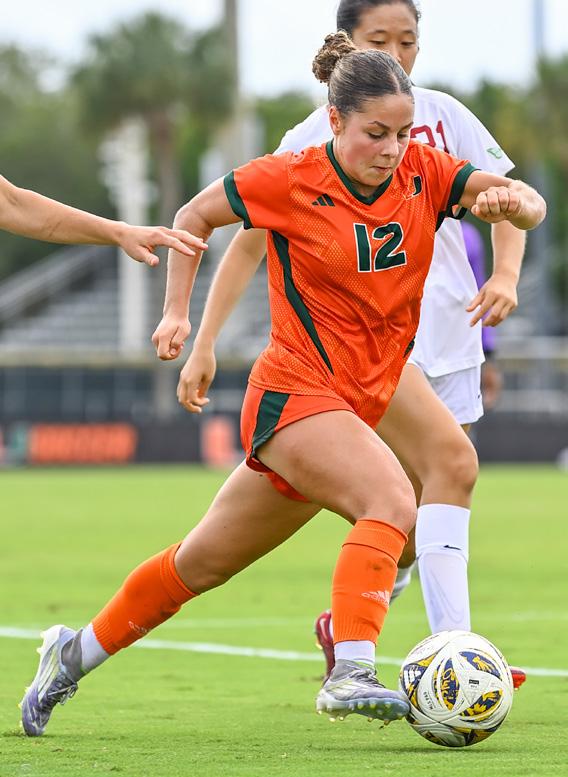
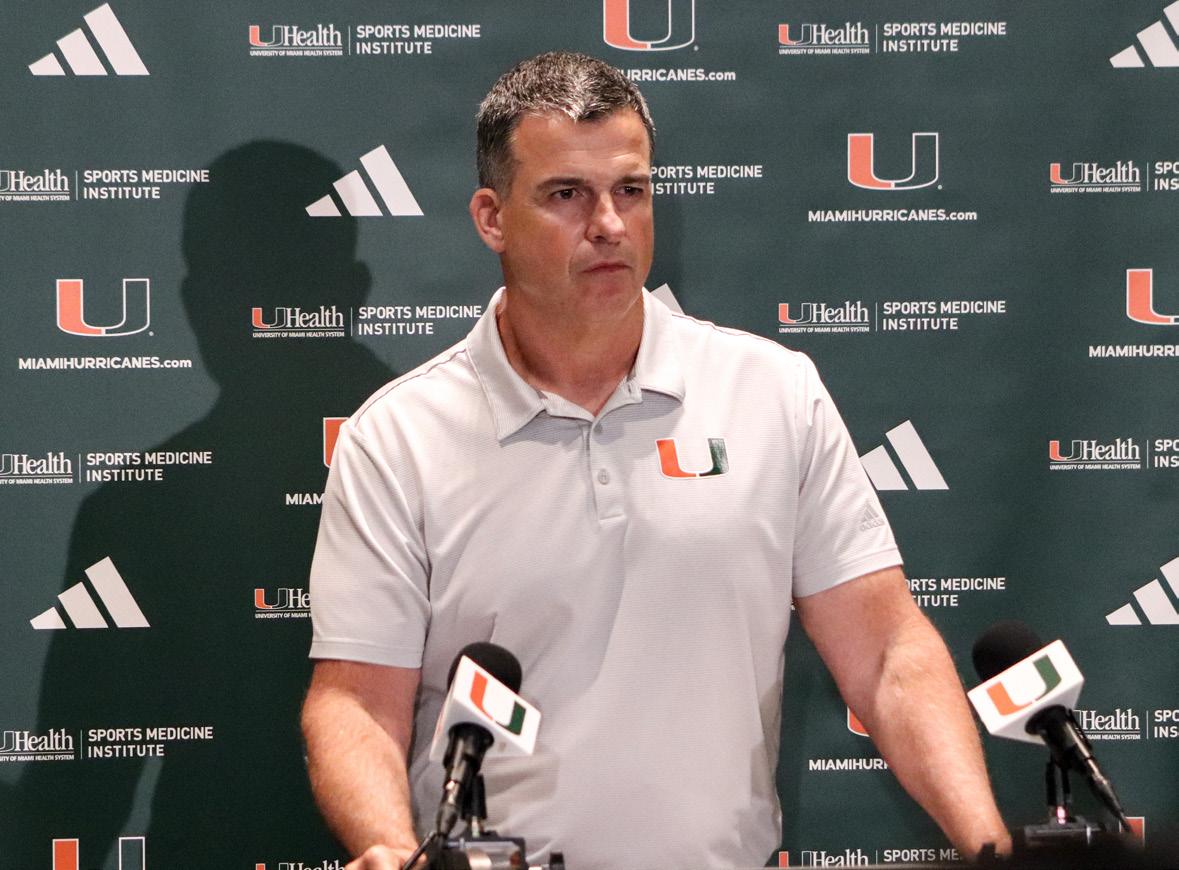
Cristobal had to find diamonds in the rough due to the small size of the FIU program. His most notable recruitment was three-star wide receiver T.Y. Hilton, who blossomed into an outstanding collegiate player and NFL star. Cristobal’s work at FIU transformed the program from a struggling bottom-feeder to 2010 Sun Belt champions.
After proving his head coaching credentials at FIU, Cristobal joined Nick Saban’s staff at Alabama — a masterclass in recruiting and program-building.
Cristobal learned priceless lessons from Saban on both recruiting and coaching, which helped him earn 247Sports National Recruiter of the Year in 2015.
After his stint at Alabama, Cristobal went across the country to Oregon. He turned the Ducks into a recruiting giant, landing the highest-rated classes in school history alongside winning two Pac-12 Championships.
His story came full circle in 2022, as Miami brought him on as head coach, the latest attempt at bringing back the swagger and culture of The U.
Cristobal started off with what he knew best; recruiting. In 2023, he landed five-star lineman Francis Mauigoa and Samson Okunlola, which established his philosophy built on physicality and toughness, while also showing his recruiting capabilities.
By Noah Gorfin Contributing Writer
Cristobal also prioritized keeping South Florida talent home, as he has built relationships with countless high-caliber high schools and coaches in the area.
The last huge reason for Miami’s recruiting success as of late is name, image and likeness. Cristobal and the ’Canes have embraced the ability to give student-athletes compensation for their play, and are using it to their advantage in recruiting.
Cristobal’s most recent use of NIL was in early 2025, when former Georgia star quarterback Carson Beck transferred to Miami instead of opting for the NFL Draft. According to multiple reports from sources such as Sports Illustrated and Athlon Sports, Beck is making an estimated three to five million dollars in NIL. Miami had the money to spend and used it on the best player available in the transfer portal.
With the Hurricanes undefeated and ranked in the top two in the AP Poll, their flair and presence remind fans of the legendary teams of the 80s and early 2000s. The energy inside Hard Rock Stadium on Saturdays is electric, and feels like games back in the Orange Bowl during Miami’s heyday.
As stated by ESPN personality Pat Macafee, “The U is Back!”
The rest of the country better get used to it.
Alarcon and Crosby Nicholson were comfortable in controlling the ball in the midfield while Moira Flynn was impressive with her hold-up play in the right striker slot. Flynn was able to produce several chances down the right side through her strength and close control, which also helped bring Teegan
city better known for surfboards than slapshots, the UM women’s hockey team has built a community where anyone who shows up with heart and hustle belongs.
Some players grew up skating before they could walk, like freshman Izzy Schaeffer, whose father built a rink for her in their backyard. Others, like sophomore Samantha Bonomi and freshman Bella Rodriguez, picked up a stick for the first time in college.
All that matters is that you show up, ready to work. And from there, the team works its magic.
“Hockey is a community,” freshman Amelia Kong says. “This program was a big reason I came [to UM].” Kong brings four years of experience to the rink.
Players come from all corners of the country, drawn not just by the sport, but by the promise of something deeper: inclusion, trust and a shared refusal to let geography or gender norms define what hockey should look like.
“If you see her, you can be her,” graduate defenseman Allie Litzinger said. “We live by that.”
For a sport often still closed off to women, the players on this team aim to be a driving force in helping to increase the number of girls who lace up their skates come winter. Although it’s one of the fastest growing sports in the U.S., hockey isn’t always an easy space for women. It’s expensive, isolating, often underfunded and overlooked.
Captain Kaila Griffin, who’s been playing hockey for eight years and has
been on Miami’s team since its inaugural season in 2022, watched this unfold in real time.
“The men’s teams are preferred over us for ice times because there are more teams, they’ve been around longer, and they have more stakes in the rink,” Griffin said. “We’re at the bottom of the totem pole.”
But that doesn’t discourage the Hurricanes.
In a city where ice shouldn’t exist, the UM Women’s hockey team has built a home for everyone who needed one.
When their skates touch the rink now, it’s not just about playing the game they love — it’s about creating a sense of belonging and carving out space for themselves, pulling up a chair to a table they refuse to be excluded from anymore. The team’s Division II classification is a well-deserved recognition of how they leave everything on the ice. And thanks to these pioneers, there will be many more chairs to come in the future.
“It’s so cool seeing girls get the opportunity to play hockey past high school,” Griffin said. “Hockey is family.”
And this team is a formidable one, at that.
Because greatness doesn’t always come from privilege — sometimes, it’s born from persistence.
That’s what it takes to build something that lasts. Thankfully, this team is as strong as they come.
And in Miami, a city synonymous with heat, the UM Women’s Hockey team proves the fiercest flames can be found on the ice.
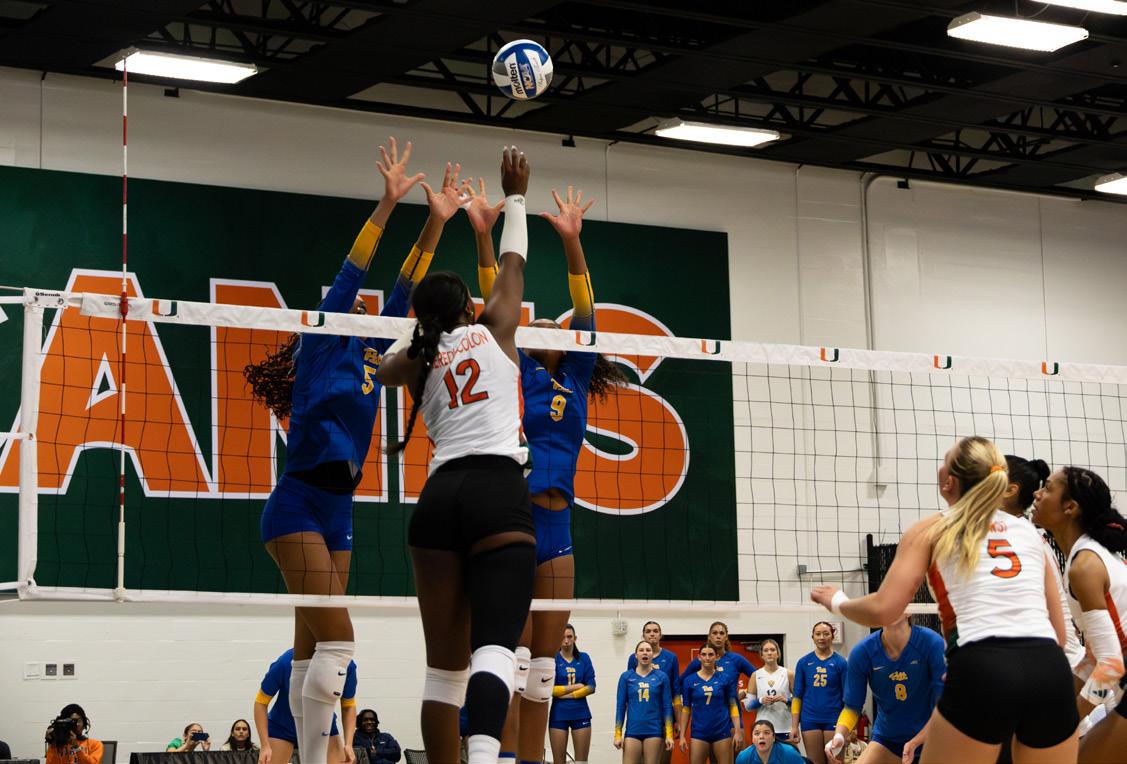
By Harrison Steinberg Contributing Writer
It was absolute bedlam at the Knight Sports Complex when the No. 18 Miami Hurricanes (15-1, 5-0 ACC) defeated the No. 4 Pitt Panthers (12-3, 4-1 ACC),on a night that ended with a ceremonial court-storm.
The Hurricanes’ 15th straight victory marked the team’s best start since Miami began 15-0 in 2002.
The first set was tight, with the two teams tying the set on 11 separate occasions, along with five lead changes. With the score at 23-23, Dalia Wilson recorded a kill off an Ariana Rodriguez assist to give Miami set point. UM then dropped three straight points to lose the first set, 26-24.
The second set was all Panthers. They started hot, scoring six straight points and extending the lead to 9-3. The margin grew to as many as 11 as Pitt closed out the set, 25-14. This left Miami trailing 2-0 and marked the first time this year the Hurricanes had to fight back from a 2-0 deficit.
Although the third set was again largely even, Miami pulled away late,
winning its first set of the night, 25-22. Flormarie Heredia Colón tallied seven kills, highlighted by scoring four of the final five points of the frame to close it out. Her last kill of the set clinched set point as it resoundingly deflected off the fingers of the Pitt block. Miami carried the momentum into the fourth set. After the score was tied at 4, the Hurricanes strung together a 7-1 run, prompting a Pitt timeout. The Panthers could not reestablish themselves, as they did not tie or reclaim the lead in the set. This was Miami’s first match that went five sets since Sept. 10, when the Hurricanes defeated Ole Miss. In the fifth set of contested action, kills from Heredia Colón and Jazmin Vergara gave Miami an early 10-6 lead. Returning the favor, Pitt’s Olivia Babcock tied the score at 11-11. Down the stretch, two Heredia Colón kills, a Rodriguez ace and a final Panthers service error encapsulated a massive upset in Coral Gables. Miami completed the reverse sweep behind Flormarie Heredia Colón’s 38 kills, a program record, and Ariana Rodriguez’s double-double with 46 assists and 12 digs.
Stanford’s lead was swiftly doubled as Shae Harvey scored at the back-post only two minutes later. Yet, Miami demonstrated grit in the 66th minute as center forward Brie Severns pressed the Stanford defense and pushed forward with the ball, allowing her to find space and place a very clinical finish into the bottom left corner of Stanford’s net to inch closer at 2-1. Severns’s goal not only kept Miami in the game, but
to a 61st minute penalty which Andrea Kitahita converted composedly to give the Cardinal a 1-0 lead.
Bella Armstrong // Contributed Photo
UM Women’s Hockey team huddles up together before its game against USF on Oct. 3, 2025.
Makena Wong // Co-Photo Editor
Head football coach Mario Cristobal answers questions during a press conference ahead of the University of Miami vs. Notre Dame football game on Aug. 25, 2025.
David Lebowitz // Staff Photographer Freshman forward Teegan Melenhorst drives toward the goal against Stanford at Cobb Stadium on Sunday,
Melissa Borges // Staff Photographer Senior outside hitter, Flormarie Heredia Colon hits the ball over during the third set against Pittsburgh on Friday, Oct. 10, 2025 at the Knight Sports Complex.

